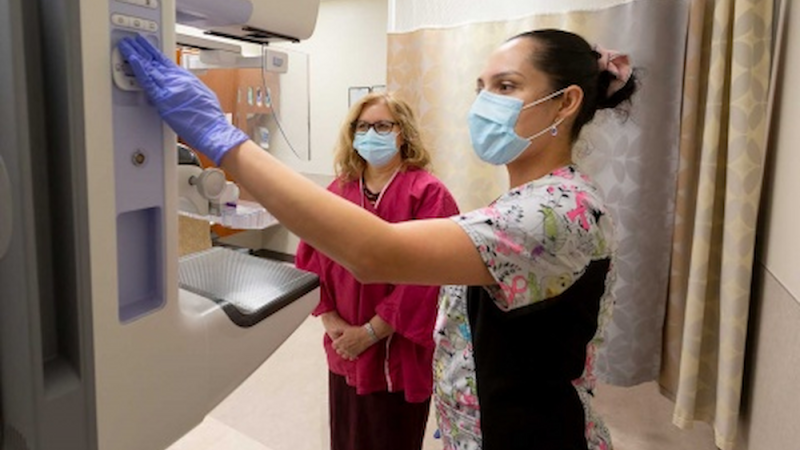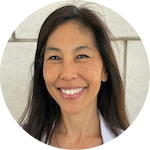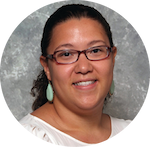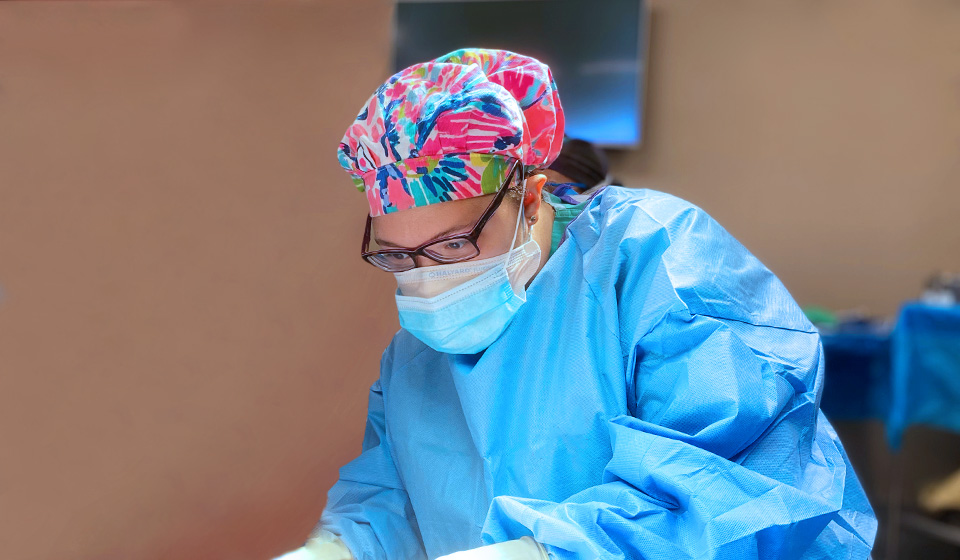
Jumping County Lines: How Duke is Expanding Access to Breast Cancer Care Across North Carolina
Photo above: A patient at the Duke Center for Women's Cancer Care Raleigh receives a mammogram examination | Photo credit: DukeHealth.org
The resources exist to be able to treat patients seeking breast care, but for Duke’s Section of Breast Surgery in the Division of Surgical Oncology, a pressing recent priority has been addressing the question of how patients can actually access the services and care available to them. Developments within the Section, including the recent hires of Maggie DiNome, MD, Instructor in the Department of Surgery, and Hannah Woriax, MD, Assistant Professor of Surgery, are leading way to the expansion of the Section’s ability to care for more patients across the state.
Leaving a Wake

Instructor in the Department of Surgery,
Division of Surgical Oncology
Dr. Maggie DiNome earned her doctor of medicine degree from the Duke University School of Medicine in 1994. After training and working for over 20 years in California, Dr. DiNome returned to Duke in late 2021.
“We have great plans for expanding clinical research and a young women’s breast cancer program in Wake County...to ensure that we continue to provide the most advanced treatments and necessary resources for the growing population in Wake County,” says Dr. DiNome on her current goals as Medical Director of Breast Cancer Services in Wake County.
Patients across North Carolina, even in Wake County, are often faced with challenges of delays in care due to the logistics of receiving referrals to see various providers being spread across geographic locations. One way that the Section is addressing this issue is

Assistant Professor of Surgery,
Division of Surgical Oncology
by adding point-of-care genetic testing to the list of comprehensive services already provided at Duke Women’s Cancer Center in Wake County. Dr. DiNome says this is important because, “for the patients that come to see us who have indications for genetic testing, we can do the genetic testing right there on the spot to facilitate more timely care and have patients see the geneticist after testing rather than before.”
Dr. DiNome also notes the unique and unmet need for a dedicated clinic to help patients with sexual health issues. Not only do some patients have difficulty with compliance with medications that negatively impact libido and mood, but others also suffer from issues of intimacy brought on by their cancer treatments. “Offering patients the support of a sexual health clinic as a part of their breast cancer treatment where they are guided through the side effects of therapy can help improve compliance and also restore self-confidence.”
Transportation challenges can also be an issue for patients trying to receive care in the state, including in Wake County. But thanks to a grant received from the American Cancer Society, Dr. DiNome says that they have been able to provide supportive services for patients who may not have had the financial resources to receive care.
“The grant pays for transportation, meals, anything for financially underserved patients with breast cancer,” she says. “It’s quite clear that there are some patients who don’t have the family structure or friends or anybody who can take them to and from appointments. And sometimes people will miss an appointment, or they will simply forego radiation treatment because it requires an everyday commitment, which they cannot make. So transportation is key.”
From Neighbor to Care Provider...and Back to Neighbor
"Transportation is key," is also a sentiment shared by Dr. Hannah Woriax. Dr. Woriax came to Duke at the end of 2021; she is settled back in her hometown of Pembroke, NC after completing residency at Virginia Tech’s Carilion School of Medicine and fellowship at the University of Alabama Birmingham, with the goal of establishing a means of care and research for breast cancer patients in rural North Carolina communities.
“The median income in this area is about $35,000, so quite a few patients do not have access to a full-time vehicle and most people live at least 15-20 minutes away from wherever they’re being seen,” says Dr. Woriax, who practices at both the Gibson Cancer Center in Lumberton and the Scotland Cancer Treatment Center in Laurinburg, NC, both part of the Duke Cancer Network.
Dr. Woriax works to address this challenge by establishing a rapport with both her patients and her staff, communicating the importance of working with and around the patient’s means and abilities.
“A lot of people here still see no difference in how we currently practice medicine and how experiments were conducted [only decades ago]. So for me, for breast cancer patients specifically, I need to educate my patients on what their options are and why we should do their genetic testing, without any negative or malicious intent.”
— Dr. Hannah Woriax, Assistant Professor of Surgery, Division of Surgical Oncology
Dr. Woriax’s journey into medicine was kick-started by watching her grandfather, former Navy corpsman and family medicine physician Frank Woriax, who was the first Native American to graduate from the Duke School of Medicine. The junior Dr. Woriax learned from her grandfather, whom she affectionately refers to as ‘granddaddy,’ the importance of giving back to their home community of rural and native North Carolinians.
“I came home to practice here because I knew that our patients deserve just as much access to care as the patients that live in more urban areas. And I can be a voice for our patients in a different space.” Dr. Woriax says, emphasizing her own credibility to both her patients and the support of the Duke Health system. “I work here, I grew up here, and I live here now. I understand the way of life and challenges on a different level.”

For Dr. Woriax, it is also important that care providers understand the historical nature of patient education in rural areas, particularly the lasting distrust for the medical community by the Native American and Black populations.
“A lot of people here still see no difference in how we currently practice medicine and how experiments were conducted only decades ago,” says Dr. Woriax. “So for me, for breast cancer patients specifically, I need to educate my patients on what their options are and why we should do their genetic testing, without any negative or malicious intent.”
Being Lumbee herself, she says, helps Dr. Woriax further establish credibility and trust with her patients, several of whom have known her since she was a child.
“I long for those meaningful and long-term relationships with my patients and their loved ones,” Dr. Woriax says. “I tell my patients every time I meet them, ‘Don't worry, you can’t get rid of me. We're in each other's lives now.’”
Today’s Goals for Tomorrow’s Future
Dr. Woriax says that she hopes the Lumberton and Scotland locations will serve as prototypes for additional programs in the future, and Dr. DiNome’s continued partnerships with medical centers on both coasts will help to improve the quality of care that the Duke Section of Breast Surgery provides. Dr. Woriax says, “Our goal is to identify where these gaps are and try to build a bridge for patients in a way that’s meaningful for them and it’s long lasting and sustainable for the community."
Give to Duke Surgery
A gift to the Department of Surgery is a gift of knowledge, discovery, and life.